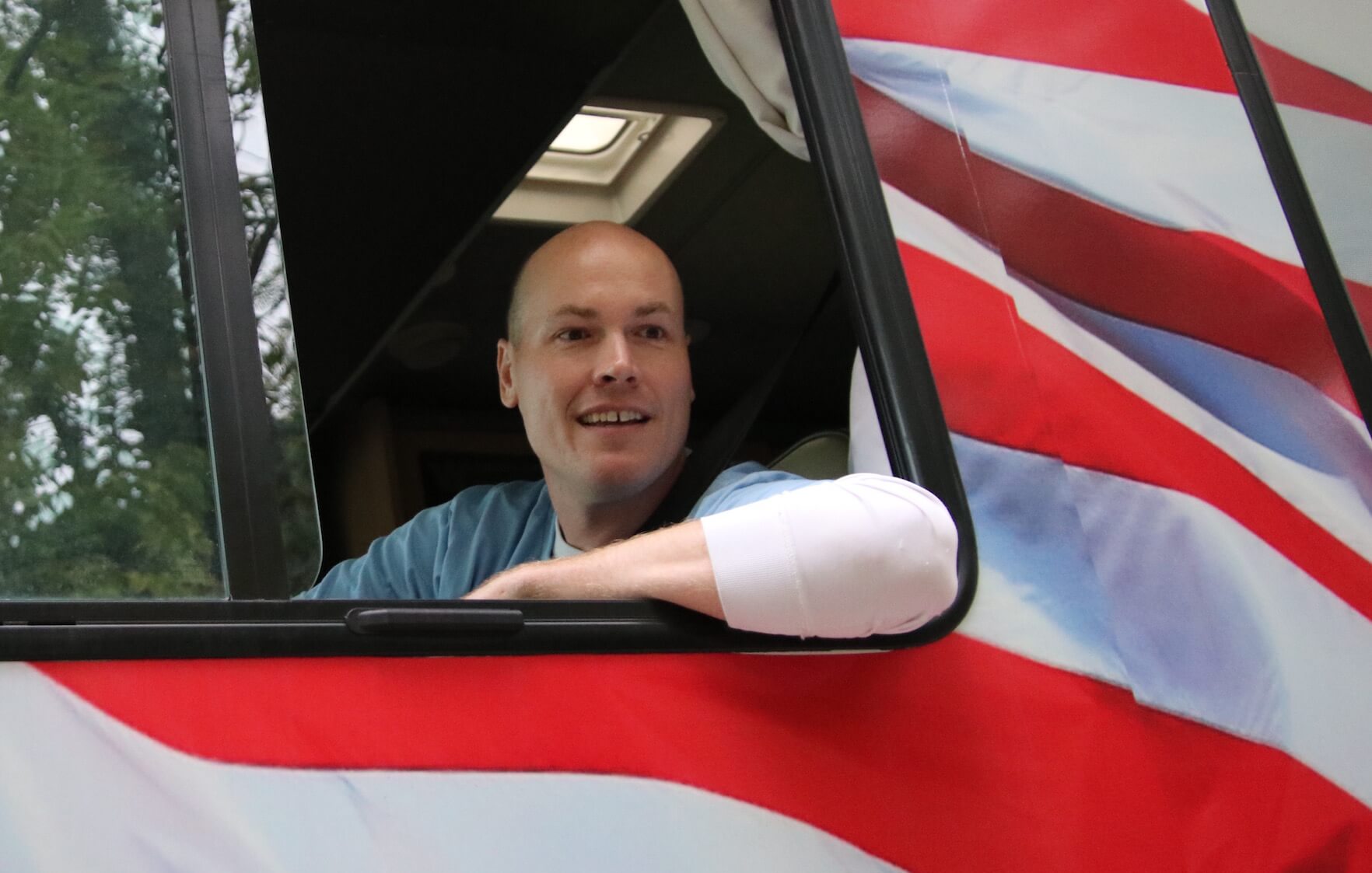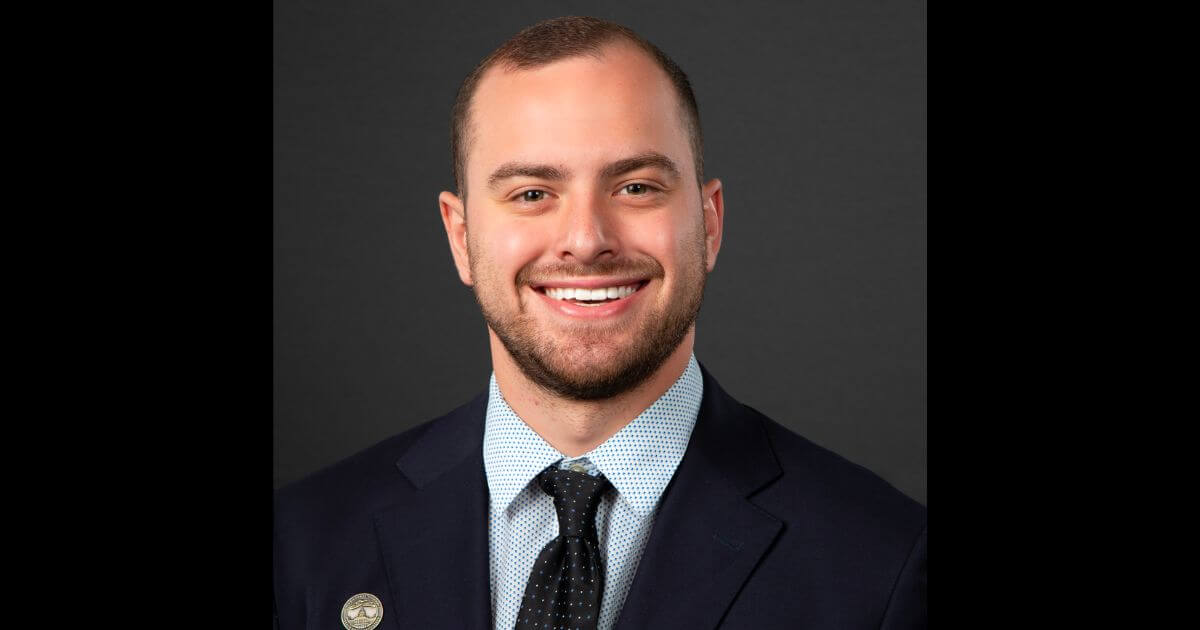
Photo by Julie Fleming
Democrat J.D. Scholten is looking for supporters in the most unlikely of places — the smallest towns west of I-35.
The 39-county congressional district Scholten is trying to win in Northwest Iowa has historically been the most conservative in the state. Residents of the 4th District repeatedly vote for Republican Congressman Steve King, sending him to the U.S. House of Representatives since 2003.
Still, Scholten hasn’t given up on winning over the district, which he came within three points of doing in 2018.
He launched a “Don’t Forget About Us” tour, during which his campaign bus, “Sioux City Sue,” stops only in towns of 1,000 people or less.
Northwest Iowa may seem like a lost cause to some, but Scholten’s push seems to be working.
During game six of the World Series last week, a dozen people showed up to meet Scholten in Early, Iowa. It’s a town in the heart of the conservative district and its population sits at a tidy 557 people. Just two hours earlier, two- to three-dozen people gathered in Pomeroy to hear Scholten speak.
Ina Rae Shannon, a 70-year-old from Alta, said people are showing up for the Democrat because they’re ready for a change in Northwest Iowa.
“We’ve got to change what we have in D.C.,” Shannon said, expressing her unhappiness with King. “J.D. has sat down and tried to figure out what we need. I think he definitely understands us.”
[inline-ad id=”0″]
Scholten Knows Rural Iowa
Scholten has a good reason he’s on the “Don’t Forget About Us” tour right now.
He likes to visit small towns, which are often times only accessible by run-down county roads, before the snow falls.
At the beginning of each town hall, Scholten tells attendees that small towns are important to him because he’s a fifth-generation Iowan and is the first in his family to grow up in the big city — Sioux City, population 82,514.
His dad grew up in Larchwood, his mother in Lake Mills.
Scholten lets the crowds know they all might have different political opinions, and that’s OK.
“At the end of the day, we’re all Iowans and we’re all Americans, and that’s first and foremost,” Scholten tells the voters.
When it comes to the most divisive subjects to talk about in Iowa’s 4th Congressional District, abortion is high on the list.
Earlier this year, King was called out by the media and his detractors after he questioned whether civilization would have survived without rape and incest.
“What if we went back through all the family trees and just pulled those people out that were products of rape and incest?” King wondered aloud during an Aug. 14 event in Kiron. “Would there be any population of the world left if we did that?”
[inline-ad id=”1″]
Still, Scholten isn’t afraid to take questions about his stance.
“How does a Democrat today speak to pro-life voters?” asked Art Cullen, editor of the Storm Lake Times and a recent Pulitzer Prize winner, in Early.
The question peaked the interest of the documentary film crew that’s been following Cullen around for the last six months. Cameras turned on. A boom mic was lifted above Scholten’s head.
“I was going to give a joke,” Scholten said, after a short pause. “I was going to say, ‘Just like this,”” as he motioned to the crowd.
“When I got asked that question a lot last cycle, I think one of the biggest things — people were more asking me about my faith than anything else,” Scholten said. “And when I talked about my faith, when I talked about the Matthew 25 Pledge I took, when I talk about those things, I think people can understand that.”
“There are a lot of people who are pro-life in this district,” Scholten continued. “But there are also a lot of people, about equal amount in number, that believe abortion should be legal. And ultimately, I don’t think folks want the federal government to be dictating what’s happening between a woman and her doctor.”
He said King was as “extreme as you can be on the issue” and his mission to outlaw abortions has led to the closure of 30 OB/GYN clinics in Iowa since he was first elected in 2002.
“So, what’s he helping with families?” Scholten asked. “You look at our policies, you look at universal health care, you look at education, you look at providing contraceptives, you look at raising minimum wage — all of those have proven to reduce abortions. And so, one could argue my stances are more pro-life than his.”
While Scholten wasn’t afraid to answer questions on social issues, his bus tour was more focused on the economic hardships that have hit rural communities, hospitals and schools in the last several years.
It’s getting harder to live in rural towns, Scholten recognizes. He told the crowd in Early that there’s not enough being done in D.C. to keep rural Iowans standing.
“I don’t know what [D.C.’s] plan is for rural America,” Scholten said. “I don’t think there is one.”
Tough Times In Rural Iowa
One of Scholten’s favorite shirts to wear on the campaign trail says, “America Needs Farmers & Farmers Need Antitrust.”
“We need to change our policies so it’s not get-big-or-get-off the farm, it’s we-all-do-better-when-we-all-do-better,” Scholten said. “You look at row crops right now, you look at corn and soy — how does an Iowa farmer get a decent price? By praying that in Indiana they have a drought.”
Scholten often quotes an Iowa State University study showing the average farmer in Iowa is north of 58 years old. That means 60% of the land in the state will be transferred in the next 20 years.
“Who is going to have the money to buy up the land and who’s going to farm?” Scholten said. “We are getting more towards precision farming and we are getting technologies that are allowing you to get more acres, but at this scale, we’re forcing farmers off the land.”
But it’s more than just the farms that are in trouble.
Joan Zubradt moved to Early in 1941. Back then, she said, the town had everything.
It had a doctor, a dentist and six or seven gas stations. The highway ran through town, as did the railroad.
It’s not like that anymore.
In March, Zubradt said, a young man who grew up in Early came back from Colorado to open a restaurant. It closed in September.
Shannon, who used to own a salon in Alta, said people needed to be able to make a living and support their families, an increasingly tough task in rural communities.
“Things have been getting kind of tight in this part of the state,” Shannon said. “When I had my hair salon, I could see my customers coming in and the financial strain was getting to them. Their Social Security checks weren’t stretching far enough and a lot of them had problems with their groceries, even.”
Grocery stores are another problem in rural Iowa.
They’ve been closing, Shannon said.
“People have to drive so far to get things now,” she said. “And it’s all costing more. It’s just a vicious cycle.”
Fixes Begin At The Roots
It’s largely unclear what, exactly, can be done to attract people back to rural Iowa.
Scholten knows where he’s going to start, though. He wants to push antitrust laws, which like his t-shirt says, farmers need.
“Eighty-two percent of farmers have to go off the farm to get income — to get a decent income — enough to survive right now,” Scholten said. “When you talk about the monopolies and everything, of the consumer dollar, less than 15 cents makes it back to the farmer, which is the lowest of all time.
“That’s why I’m so passionate about enforcing our antitrust laws,” Scholten said. “We’ve got to give farmers a chance, because right now everything that’s happening is dictated by policy or things that are happening in D.C. by folks who don’t have a clue about what’s happening here in places like the 4th District.”
Farms are in crisis right now, Scholten said, because business is dictated by multinational corporations, and it’s sucking the wealth out of small towns.
“We need fairness. Capitalism without competition is not capitalism. This is the same fight we fought 100 years ago,” Scholten said. “We all know that if the farmer is doing well then the co-op in town is doing well and the gas stations and everything else is doing well. It’s a trickle effect.”
Victory Runs Through Small Towns
Nearly one year ago, Scholten lost his first bid against King, but far outpaced all expectations on the race.
He moved the needle 24 points from the Trump/Clinton margin in 2016 in the district — the third most for a congressional district in the nation. He received 25,000 more votes than there are registered Democrats in his district. And he outperformed the top of the ticket by 17%.
Scholten said he was most proud of winning Woodbury County with 54% of the vote, the county where he lives had never opposed King before.
In the end, Scholten lost by just 3 percentage points.
He’s more confident this time around, though.
“Last time, I thought we could win,” Scholten said. “This time, I expect we will win.”
By Paige Godden
Posted 11/4/19

Lanon Baccam wins 3rd District Dem primary, will face Zach Nunn
Baccam defeats Melissa Vine to challenge Republican incumbent Lanon Baccam defeated Melissa Vine in Tuesday’s Democratic primary for Iowa’s 3rd...

Hardin County man running for office as Trump-loving Democrat to local party’s dismay
Brad Rewoldt, who recently changed his party affiliation from Republican, says his support of Trump will probably 'piss off' Democrats There is a...

Scheetz: Tax cuts for all Iowans, not just the wealthy
State Rep. Sami Scheetz says all Iowans should benefit from tax cuts via a sales tax reduction As a state representative, my job is to serve the...

Kalbach: What Iowa Republicans focused on during legislative session
Our state legislative session finished up towards the end of April, and I’m glad it’s over! From further de-funding and privatizing our public...

Advocates file suit to stop Iowa’s ‘unconstitutional’ immigration law
Immigration advocates filed a federal lawsuit Thursday to stop Iowa’s new immigration law—SF 2340—from taking effect arguing that the legislation...

Iowa Republicans make outlawing gay marriage key 2024 campaign priority
Iowa Republicans have made outlawing gay marriage a key goal in their 2024 party platform. During the Iowa GOP’s 2024 state convention on Saturday,...




